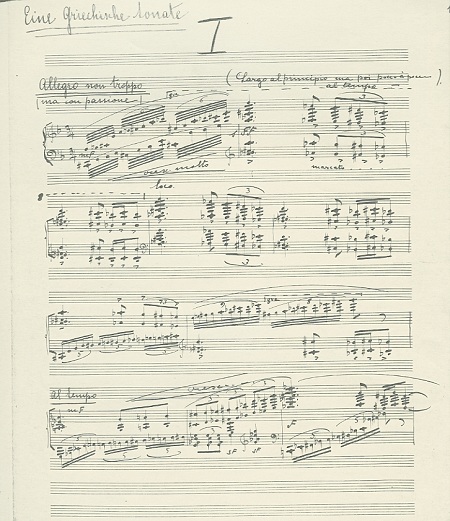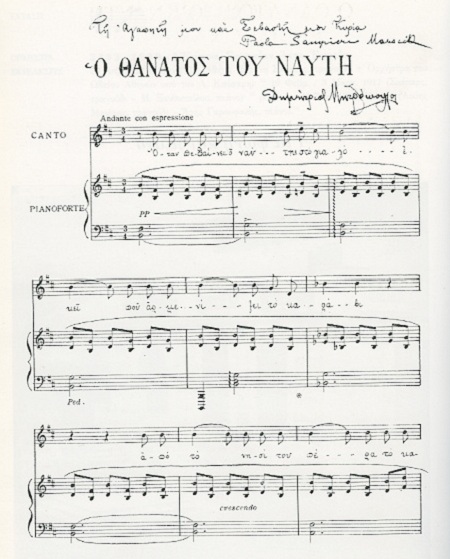Apostolos Kostios
DIMITRI MITROPOULOS
Life, part (b):
The uniqueness of the Greek musician
The conductor, pianist, composer and teacher Dimitri Mitropoulos wasn’t ignored in his days. On the contrary, he was noted as one of the leading conductors of his times and was awarded highest distinctions by the Greek State and by the most important Europe and America’s music foundations.
His reputation owes nothing to publicity. It stems from the wide recognition of the audience. It became stronger, in the serious critique’s conscience, as well as in the conscience of the musicians of the greatest orchestras of the world, the harshest judge. Certainly, that wouldn’t be enough to explain the continuous –fifty years after his death– increase of interest in Mitropoulos. The truth is that those who experienced his performances, are now discovering, with surprise, a much more important artist than they had thought, while those who have recently been acquainted with his interpretations, have found out a unique personality without an equal among today’s musicians.
The possibility of a continuously increasing discovery of new aspects of Mitropoulos’s personality, exists, because of the fact that that the Greek musician was ahead of his time, so, he functioned as a Prophet among his contemporaries, while, for today, he has the effect of a Preacher. It is about a “uniqueness” –a combination of separate special achievements, concerning the recreation- interpretation and the creation– composition, such as:
―Mitropoulos would always conduct and play from memory, even at the rehearsals. Nevertheless, he didn’t have a “photographic” memory, as it is often, wrongly, implied. Certainly, a tendency existed, but it was only because of his hard work and constant effort that he finally gained so great an ability of memorizing, as no other conductor has ever succeeded in. Although Psychology has invented new methods of memorizing and memory exercises, Mitropoulos’s techniques still remain unrivalled and are used by many would-be conductors.
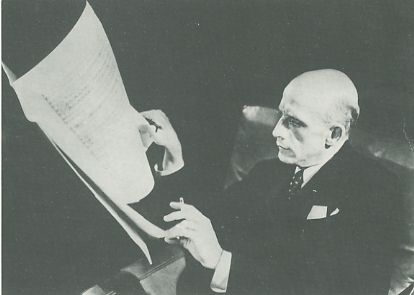 |
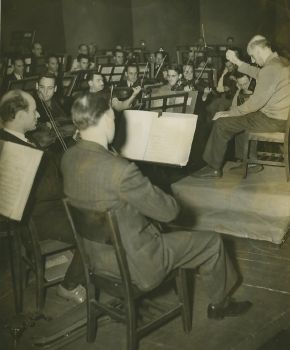 |
| 1 | 2 |
―He developed an absolutely personal technique that visualized the music , substituted for the notation’s insufficiency, could be responsive to the requirements of the various music style’s works, was approachable to the musicians of the orchestras, who, through this method, could overcome their difficulties and achieve more than their own natural abilities would have possibly afforded them. The critics could, often, only explain the accomplishment of such irreproachable performances –in some cases after very few rehearsals– as a “miracle”.
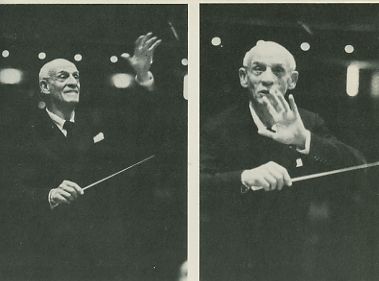 |
 |
―Through his performances and his views, he contributed to the development and the domination of the right interpreting approach, according to which the “performing praxis” is not necessarily related to a specific period’s works, but concerns the music of all eras. His contribution has to do with the fact that he could, already, since the middle twenties, distinguish between an interpretation “faithful to the score”, and an interpretation “faithful to the work itself”.
―His interpretations are still, after half a century, exceptional samples of re-creative art. They bear the genuineness’s stamp of an absolutely personal approach, while, at the same time they are classic -as it is de facto proved- which means that they resist time and appear to be so multi-prismatic, that they lose nothing of their first glamour, as the perspective of their approach (according to the historic evolution) and the way they are perceived (on the analogy of every age’s habits and aesthetic tendencies and views) are changing.
―He responded in a brilliant manner to the requirements of the double role of soloist and conductor, playing the piano and conducting simultaneously· he was (and still remains) the only one who ever dared to perform modern composer’s works (Prokovief, Krenek, Malipiero, Roussel and others), of such a sophisticated music idiom and technique that, even career pianists avoided to include in their repertoire , while in his, thirteen titles (concerts etc.) of works for piano and orchestra are included, s. Mitropoulos' repertoire as conductor/ Pianist
.
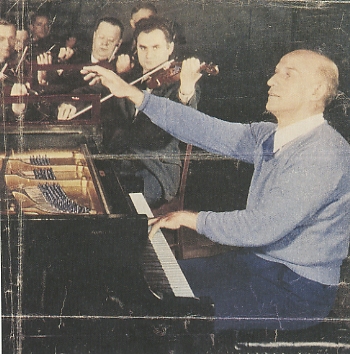 |
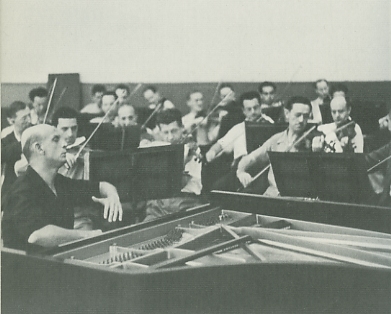 |
―It was him who made forgotten works known, revealed the Greatness in the works by minor composers. He convinced, through his performances, the specialists, to re-examine their opinions for some composers, he rejected the 'established' appreciations by reforming the value scales, and he suggested new approaches of the classic repertoire's works, that opened new perspectives to the problems of interpretation.
―The Greek conductor's name was related with Gustav Mahler's, although the number of his performances of Mahler's works doesn't seem so great. Nevertheless it should be taken into consideration the fact that at that time Mahler had not been recognized as a classic symphonist, on the contrary, many of the critiques declared themselves allergic to Mahler's music. The great Toscanini would mock at it, while in Vienna, the Philharmonic and Herbert von Karajan maintained an attitude towards Mahler's symphonies, that could be characterized distant or even negative. Mitropoulos fought for the promotion and the establishment of Mahler's music with enthusiasm, as a missionary. That is not irrelevant to the fact that the new interest in Mahler, the "Mahler renaissance",started in the early sixties in America, and, undoubtedly, the pioneer was the Greek conductor, not Bernstein, as it is wrongly claimed by vehicles of various outlooks and interests, nationalistic, commercial etc. These are the same ones who attribute to Karl Böhm the rise of the audience’s interest for Alban Berg's operas. Nevertheless, the historic events themselves contradict them: the performance of Wocceck by Mitropoulos at the Carnegie Hall in the early fifties, opened out new prospects and gave this work the passport for "all the countries", starting from Italy: After its premiere at the Milan Theatro alla Scalla, the most important stronghold of the belcanto had already been conquered!
―At that time, contemporary music had not taken up its place at the established repertoire. It was not approachable to the general public, it was only performed during the so called "ghetto concerts", for a minority of initiated (or ignorant snob). At the same time Mitropoulos would form his repertoire programmes based on a specific strategy, with specific aims, to attract as many listeners as possible for that music that remained unknown for the majority.
―Mitropoulos is the only conductor ever that, not being in charge of an orchestra specialized in “contemporary” music’s works, but as a permanent conductor of “current” repertoire’s orchestras (the Minneapolis and the N.Y. Filharmonic), performed more than 80 international premieres of avant-garde composer’s works of his age, during the scheduled concerts (either the subscriber concerts orthe popular ones). Many of these works were his own assignments.
―To the effort at reviving Greek ancient drama, his contribution as acomposer of the music of Electra by Sophocles and Hippolytos by Europides, was of crucial importance for further development.
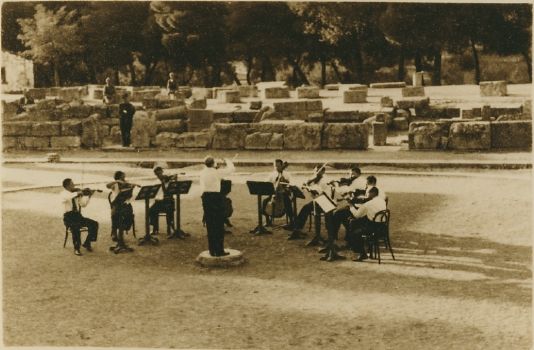 |
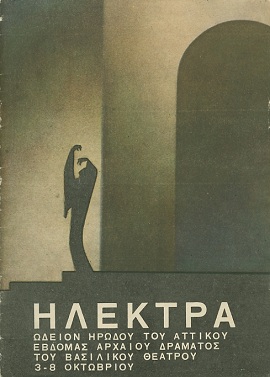 |
| 1 | 2 |
―Dimitri Mitropoulos is, internationally, included among the earliest composers who dared to apply the twelve-tone technique by Arnold Schönberg, (before Nikos Skalkottas), while at the same time his own(Schoenberg's) students would move slowly and with hesitation towards the Austrian composer's method. Mitropoulos also succeeded in combining, in an ingenious manner, the most contemporary idioms with "traditional" elements.
―He was a herald of our age during which every nation's folk music is neither functioning as base for the creation of a late national music, nor rejected, as folklore, as an element of European exoticism , in favour of a cosmopolitan music idiom, but it is only coming to enrich, with the national muse's primitive strength, the modern (of today) ways of an international music language’s expression.
―The folk music's element, at his late works, rejecting its "traditional" decorating character and taking up a specific functional part to the compositional system of serious music, becomes upgraded. This process is leading to the democratization of the music, a democratization through the equal acceptance of elements coming from an "inferior class", the democratization of the music itself, and not only of its way and means of diffusion. And in these sense, Mitropoulos is similar to Béla Bartok.
|
|
|
| 1 | 2 |
―Passing through Neoclassicism and the Second Viennese School, with his second period’s works (from 1924) as a composer, not only was he in advance of his time, but he was also a herald of a more recent age, that reaches our age, so he is considered as modern, even for today. In addition, another evidence is the fact that his work is internationally becoming more and more popular and is admired by the performers as well as by the audience.
―Mitropoulos did not express himself only through his art, but also through his profound and original written word. His texts, (letters, articles, lectures, interviews etc) are important, not only for those who deal with Music, but, more generally, for the men of Arts and Letters.
―His exceptional personality is completed by its human side (in addition to the artistic one). He had said: «I am a human being that seeks love. Even my art am I using for this purpose. My life as an artist has been successful only because it has always expressed my need for communication and love between me and the audience». Faithful to this purpose, he walked during his whole life “with divesting discipline, doubts and humility” (as he wrote to his friend the Nobel awarded poet Giorgos Seferis), giving his art’s aesthetic content a purely human dimension, which is really rare in our times.
Distinctions
For his offer as a performer-recreator, Mitropoulos was awarded with the distinctions mentioned bellow:
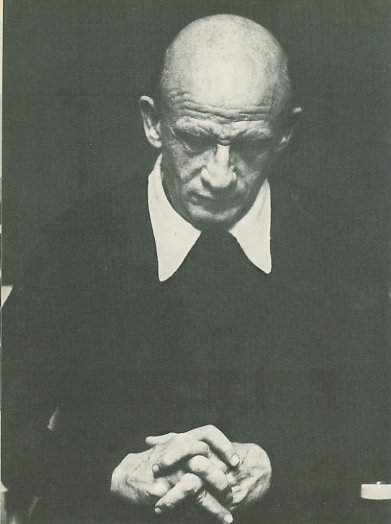 Aριστείον Mουσικής της Aκαδημίας Aθηνών (1927)
Aριστείον Mουσικής της Aκαδημίας Aθηνών (1927)
Aξιωματικός του Tάγματος του Iταλικού Στέμματος (1931)
Πρόσεδρο Mέλος της Aκαδημίας Aθηνών (1933)
Iππότης της Λεγεώνας της Tιμής (1935)
Aργυρούς Σταυρός του Tάγματος του Σωτήρος
Tιμητικό Δίπλωμα του Πανεπιστημίου της Mινεζότα (1949)
Aξιωματικός της Λεγεώνας της Tιμής (1951)
Διδάκτωρ των Kαλών Tεχνών του Syracusse University (1951)
Διδάκτωρ της Mουσικής του Πανεπιστημίου του Σικάγου (1951)
Mετάλλιο Ά. Σαίνμπεργκ του Διεθνούς Συνδέσμου Συγχρόνου Mουσικής (1952)
Διδάκτωρ της Φιλοσοφίας του Πανεπιστημίου του Xάρβαρντ (1952)
Tιμητικό Δίπλωμα του Συλλόγου των Mουσικοκριτικών της Nέας Yόρκης (1953)
Σταυρός των Tαξιαρχών του Tάγματος του Φοίνικος (1954)
Διδάκτωρ της Mουσικής του Πανεπιστημίου της Nέας Yόρκης (1955)
Mετάλλιο του Συλλόγου των Φίλων της Mουσικής, Aθήνα (1955)
O “Xρυσός Oρφέας” της πόλης της Mάντουα (1956)
Tιμητικό Δίπλωμα του Eθνικού Συμβουλίου Mουσικής / UNSESCO, H.Π.A. (1957)
Accademico onorario της Eθνικής Aκαδημίας της Aγ. Καικιλίας της Pώμης (1958)
Mετάλλιο της Πόλεως της Nέας Yόρκης (1958)
Eπίτιμος Eταίρος της Aκαδημίας Aθηνών (1959)
Xρυσό “Mετάλλιο Otto Nikolai” της Φιλαρμονικής της Bιέννης (1959)
Xρυσό “Mετάλλιο Γκούσταβ Mάλερ” της Διεθνούς Eταιρείας Γκ. Mάλερ (1960)
I am working with the superlative possible unselfishness to serve the creator’s idea…
Βασική βιβλιογραφία
* Απόστολος Κώστιος, Δημήτρης Μητρόπουλος, (έκδ. Μορφωτικού Ιδρύματος Εθνικής Τραπέζης), Αθήνα 1985
* William Trotter, Ο Ιεροφάντης της Μουσικής – Η ζωή του Δημήτρη Μητρόπουλου, (μτφρ. Αλέξης Καλοφωλιάς, έκδ. ΠΟΤΑΜΟΣ), Αθήνα, 2000
* Δημήτρης Μητρόπουλος – Η Αλληλογραφία του με την Καίτη Κατσογιάννη (έκδ. Ίκαρος), Αθήνα 1966
* Κείμενα Δημήτρη Μητρόπουλου, (Επιλογή – Σχόλια Απ. Κώστιου / έκδ. Ορχήστρα των Χρωμάτων / Βιβλιοπωλείον της “ΕΣΤΙΑΣ”), Αθήνα 1997
* Απόστολος Κώστιος, (επιμέλεια Τάσος Κολυδάς), Δημήτρης Μηρόπουλος: Κατάλογος Έργων, (έκδ. “Ορχήστρα των Χρωμάτων” / Βιβλιοπωλείον της “ΕΣΤΙΑΣ”), Αθήνα 1996
(Βλ. και Εκδόσεις: Βιβλία)

